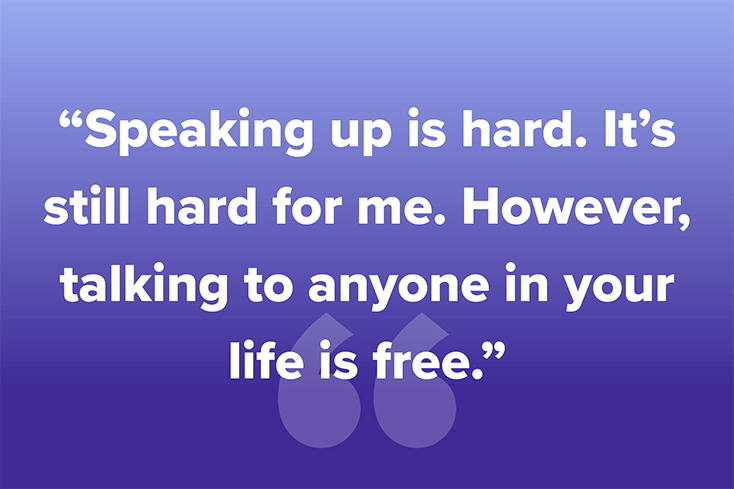April 07, 2022
By Philip Piscitelli

On Jan. 31, 2022, I found myself in the admissions building of an inpatient psychiatric care facility where I would spend the next 28 days in an intensive Dialectic Behavioral Therapy program. I admitted myself of my own volition — afraid, anxious, hopeless and unsure of what to expect. However, having the courage to make this decision was long overdue.
My struggles with my mental health began as a child. After being physically, psychologically and emotionally abused by my maternal grandmother for the first seven years of my life, I not only developed what would later be diagnosed as PTSD, but developmental disorders, self-esteem issues, intimacy issues and both physical and emotional scars that would haunt me for the next three decades. I never spoke up.
When I was 16, I was a model student on the outside. I was in the top ten people in my graduating class, volunteered at a hospital, presided over several clubs and activities, played baseball, made friends and had a girlfriend. On the inside, I was suffering from debilitating panic attacks and suicidal thoughts. I spent days in bed. I never spoke up.
When I was in my early 20s, I began to lose total control of my inner dialogue and mental health. I was given a prescription for a Ativan tablets, which I ran through in a week, and I was referred to a therapist. In therapy, I couldn’t find the words to describe how terrible I was feeling. I continued to suffer alone. I never spoke up.
At twenty-one, I finally saw a psychiatrist and was formally diagnosed with PTSD, insomnia and a host of other depressive and anxiety disorders. I was prescribed medications I didn’t know the names of. I also didn’t know the side effects, of which there were many. I stopped taking them. I struggled my way through college masking all my pain with substance abuse. I never spoke up.
Throughout my 20s, I experienced true hopelessness. Occupational issues, relationship issues and family issues compounded my existing challenges and led to a constant thunderstorm of depression, loneliness, isolation, substance abuse and worsening mental health. I saw friends getting engaged, buying houses, getting their dream jobs and living seemingly happy lives. I withdrew. I spent years alone; hiding myself from the outside world because I didn’t feel like I belonged in it. I resigned myself to a sad, hopeless, unfulfilling life. I buried myself in my work to distract my brain from the intrusive and traumatic thoughts that continued to feed all the pain I went through. Friends saw me struggle. Family saw me struggle. I never spoke up.
In December 2021, I found myself lying in bed for days at a time, not sleeping, not eating and ignoring messages from friends. I had given up and was planning to end my own life. Luckily, there was a small glimmer of hope in me that I could be better. I recognized how I gave so much love to friends, family and my community — I just needed to give some to myself. So I spoke up.
After my stay at the inpatient facility, I have a new lease on life. My friends and family are loving, caring and supportive. They were proud of me for having the guts to admit that I wasn’t alright and needed help. I don’t look at the past anymore. I’m focused on the future. Part of my future is going to be making sure that people who are struggling can get the help they need when they need it.
The stigma surrounding mental health — both at the individual and societal level — discourages people from taking the steps I took. Even when people want to reach out to help, the resources are often unavailable. I’ve been through that, and it exacerbates all the mental health conditions that overwhelmed me.
I’ve seen friends and family members lose their battle with their mental health. I never want to see that again. Speaking up is hard. It’s still hard for me. However, talking to anyone in your life is free. Even without any resources, having someone who has your back and being truthful with them will help. It will help change the discourse on mental health and the preconceptions and stigmas surrounding it.
I spoke up. So should you.
Submit To The NAMI Blog
We’re always accepting submissions to the NAMI Blog! We feature the latest research, stories of recovery, ways to end stigma and strategies for living well with mental illness. Most importantly: We feature your voices.
LEARN MORE